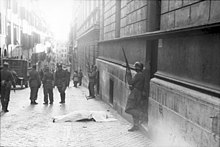Via Rasella attack
| Via Rasella attack | |||||||
|---|---|---|---|---|---|---|---|
| Part of the Italian Campaign of World War II | |||||||
 Soldiers of the Polizeiregiment "Bozen" in Via Rasella following the attack. | |||||||
| |||||||
| Belligerents | |||||||
|
|
| ||||||
| Units involved | |||||||
| PAG combatants | Polizeiregiment "Bozen" | ||||||
| Strength | |||||||
| 11 | 156 | ||||||
| Casualties and losses | |||||||
| None |
142 men (32 killed, 110 wounded) | ||||||
The Via Rasella attack (Italian: Attacco di Via Rasella) was an action taken by the Italian resistance movement against the Nazi German occupation forces in Rome, Italy on 23 March 1944.[1][2][3][4][5]
Location

Via Rasella is located in the centre of the city of Rome, in the rione of Trevi; it connects Via delle Quattro Fontane (next to the Palazzo Barberini) with Via del Traforo, and took its name from the property of the Raselli family which was located there.[6]
History

The attack was led by the Patriotic Action Groups (GAP) against the 11th company of the 3rd battalion of the Polizeiregiment "Bozen" (Police Regiment "Bozen" from Bolzano[7]), a military unit of the German Ordnungspolizei ("Order Police") recruited in the largely ethnic-German Alto Adige region in north-east Italy, during the de facto German annexation of the region (OZAV). At the time of the attack, the regiment was at the disposal of the German military command of the city of Rome, headed by Luftwaffe General Kurt Mälzer.[8][9]
The attack

The attack on 23 March 1944 was the largest Italian partisan attack against the German troops. The GAP members, under the orders of Carlo Salinari (Spartacus) and Franco Calamandrei (Cola), were on Via Rasella during the passage of a company of the Police Regiment "Bozen", consisting of 156 men.[10]
The action began with the explosion of a bomb deposited by Rosario Bentivegna. Eleven other partisans participated:
- Via del Boccaccio: Franco Calamandrei, placed at the corner of the street, Carlo Salira near the tunnel and Silvio Serra;
- Via Rasella: Carla Capponi, Raul Falcioni, Fernando Vitagliano, Pasquale Balsamo, Francesco Curreli, Guglielmo Blasi, Mario Fiorentini and Marisa Musu who provided cover fire by using a mortar.[11]
The other members of the group were absent for various reasons: Lucia Ottobrini was ill, and Maria Teresa Regard was opposed to the choice of the place of the attack.
The attack saw the annihilation of the 11th company and caused the death of 32 men and about 110 wounded as well as two civilians, while the partisans did not have any losses.
German retaliation
Ardeatine Caves
In retaliation, the German troops killed 335 persons, prisoners and people rounded up, almost all of them civilians in the Ardeatine massacre, organized and conducted by SS Obersturmbannführer (Lieutenant colonel) Herbert Kappler, head of Sicherheitspolizei ("Security Police") and Sicherheitsdienst ("Security Service") in Rome.
References
- ^ Candeloro, Giorgio (2002). Storia dell'Italia moderna (in Italian). Vol. Volume X. Feltrinelli.
{{cite book}}:|volume=has extra text (help) - ^ Katz, Robert (2009). Roma città aperta (in Italian). il Saggiatore.
- ^ Portelli, Alessandro (2005). L'ordine è già stato eseguito (in Italian). Donzelli.
- ^ Erra, Enzo; Caroleo Grimaldi, Francesco (1999). La Repubblica di Via Rasella (in Italian). Settimo Sigillo.
- ^ Capponi, Carla (2009). Con cuore di donna (in Italian). il Saggiatore.
- ^ "Via Rasella". Dipartimento Cultura – Servizio Commissione Consultiva di Toponomastica (in Italian). Comune di Roma. 14 July 2013.
- ^ Renamed SS-Polizeiregiment "Bozen" on 16 April 1944.
- ^ Staron 2002, p. 38
- ^ Wedekind 2003, p. 329
- ^ "23 marzo 1944: azione partigiana a Via Rasella". Controappuntoblog.org (in Italian). 23 March 2012.
- ^ "Parla Mario Fiorentini". Il messaggero.it (in Italian).
Bibliography
- Wedekind, Michael (2003). Nationalsozialistische Besatzungs- und Annexionspolitik in Norditalien 1943 bis 1945.: Die Operationszonen Alpenvorland und Adriatisches Küstenland (in German). Oldenburg Verlag. p. 523. ISBN 3-486-56650-4.
- Staron, Joachim (2002). Fosse Ardeatine und Marzabotto: Deutsche Kriegsverbrechen und Resistenza (in German). Paderborn: Verlag Ferdinand Schöning. p. 392. ISBN 3-506-77522-7.
